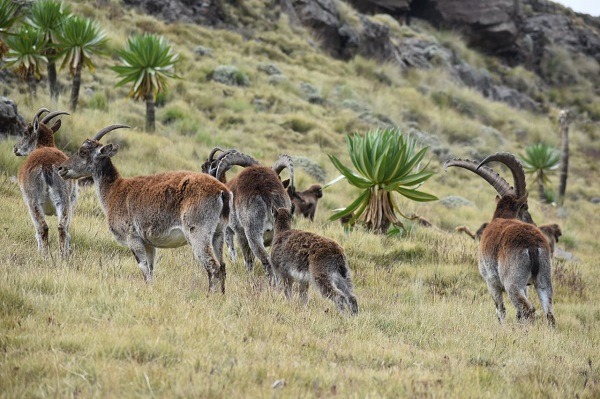The Walia Ibex, a wild animal endemic to Ethiopia, is facing a significant risk of extinction.
Once abundant in the Simien Mountains National Park, one of Ethiopia’s premier wildlife sanctuaries, their population has dramatically declined.
The park, which once housed over 900 ibexes, is now home to only 306, a reduction that has raised serious concerns.
According to the park’s head officer, Mr. Maru Biyadgelign, this decline is primarily due to security issues in the region.
Gunshots from ongoing conflicts have disturbed the natural habitat of the Walia ibex and other wildlife, leading to widespread displacement.
The presence of firearms and conflict in key wildlife areas has scared many animals away from their native habitat, further threatening the survival of species such as the Walia ibex.
A recent census conducted by the National Wildlife Authority confirmed a worrying trend: the number of young ibexes, or colts, has decreased significantly.
This decline in the younger population is particularly alarming, as it threatens the species’ ability to recover naturally over time.
Mr. Maru also noted that in addition to displacement, these rare animals are being hunted, sometimes for target practice, exacerbating their vulnerability.
Poaching and illegal hunting have compounded the crisis, making the Walia ibex even more endangered.
To counter these threats, a Walia Ibex Recovery Plan is currently in the works. A detailed study is being conducted to support the initiative, and once completed, the plan will be swiftly implemented. In the meantime, a dedicated team has been established to monitor the situation and protect the park’s wildlife from further harm.
Simien Mountains National Park, located 120 kilometers northeast of Gondar in Amhara regional state, is one of Ethiopia’s most prized national parks.
Established by government decree, the park covers an area of 412 square kilometers and is renowned for its breathtaking landscapes and rich biodiversity.
The park’s dramatic topography, with its jagged mountain peaks and deep valleys, has long been an attraction for tourists and nature lovers worldwide.
The park is home to several rare and endemic species, including the Walia ibex, the Ethiopian wolf, Menelik’s bushbuck, and the Gelada baboon.
Additionally, it supports over 1,200 species of plants and more than 200 bird species, five of which are found only in Ethiopia.
Due to its exceptional natural beauty and biodiversity, Simien Mountains National Park was designated a UNESCO World Heritage Site in 1978.
It is considered a global heritage site, reflecting its significance not just for Ethiopia but for the world.
The park’s unique ecosystem and rare species make it a crucial conservation area, though it now faces serious challenges due to both human activity and environmental pressures.
